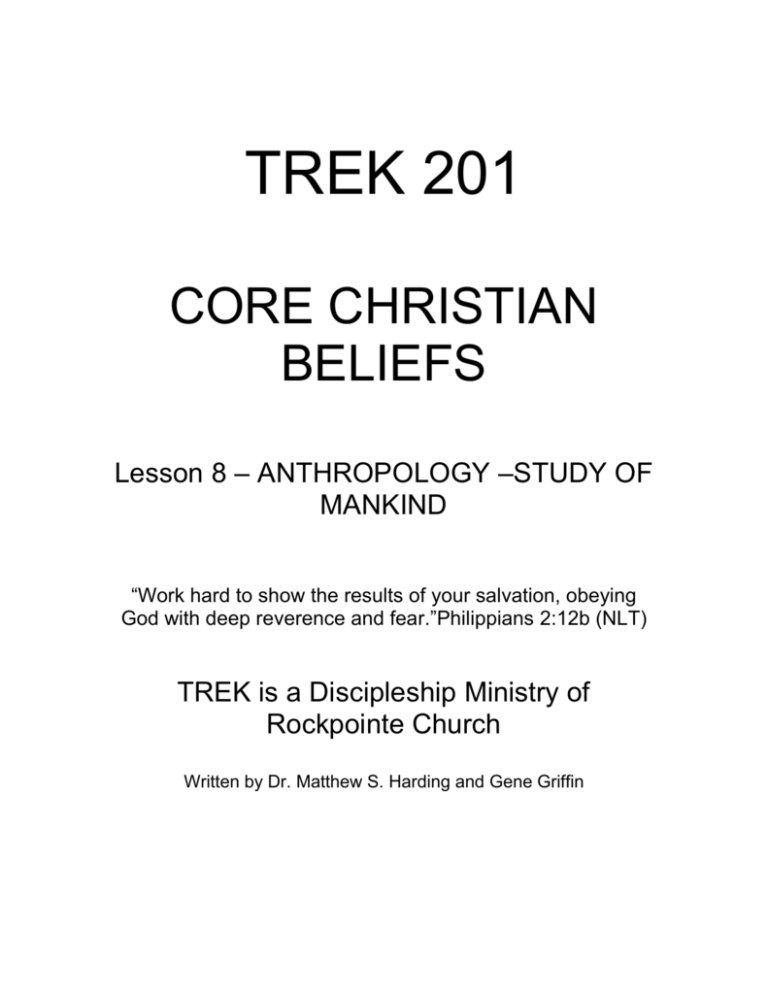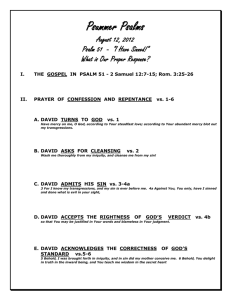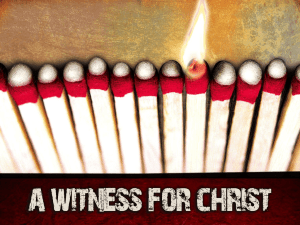anthroplogy—study of man
advertisement

TREK 201 CORE CHRISTIAN BELIEFS Lesson 8 – ANTHROPOLOGY –STUDY OF MANKIND “Work hard to show the results of your salvation, obeying God with deep reverence and fear.”Philippians 2:12b (NLT) TREK is a Discipleship Ministry of Rockpointe Church Written by Dr. Matthew S. Harding and Gene Griffin 2 ANTHROPLOGY—STUDY OF MAN The American Anthropological Association (AAA) defines anthropology as “the study of humans, past and present. To understand the full sweep and complexity of cultures across all of human history, anthropology draws and builds upon knowledge from the social and biological sciences as well as the humanities and physical sciences. A central concern of anthropologists is the application of knowledge to the solution of human problems.” Using this perspective, what is man (mankind)? Man is thought of in terms of what they are able to do. For example, an employer “rents” an employee for a certain number of hours a day. The employer’s interest is keeping the employee functioning effectively. They are of value as long as they are useful. Therefore mankind is hardly more than machines. Another perspective from this definition is seeing mankind primarily as members of the animal kingdom and as derivatives from some of its higher forms. In this view the way to gain knowledge of man is by experimentation with animals. Experiment with animals. Apply the conclusions to mankind who is merely a higher animal. There is another perspective not considered by the AAA – the Christian view of man. This perspective affirms we are creations of God, made in the image of God. This means man did not originate through chance or process of evolution but through a conscious and purposeful God. The Ps illustrates man as God’s pinnacle of creation: “what is man that you are mindful of him, the son of man that you care for him? 5 You made him a little lower than the heavenly beings and crowned him with glory and honor. 6 You made him ruler over the works of your hands; you put everything under his feet: 7 all flocks and herds, and the beasts of the field, 8 the birds of the air, and the fish of the sea, all that swim the paths of the seas.” Psalm 8:4–8 (NIV84) Let’s dig deeper into the study of mankind from God’s point of view. What is man? Why was man created? What does it mean to be created in the image of God? What happened in the Garden that reverberates through history and touches our lives today? Note: Man (mankind) is used to refer to the entire human race. Its use is not meant to be insensitive to women but to reflect the Biblical proclamation of Gen 1:26 “Then God said, “Let us make man in our image, in our likeness…” A. THE ORIGIN OF MAN Read Gen 1:25-27 26 Then God said, “Let us make man in our image, in our likeness, and let them rule over the fish of the sea and the birds of the air, over the livestock, over all the earth, and over all the creatures that move along the ground.” 27 So God created man in his own image, in the image of God he created him; male and female he created them. 1. God created man as his crowning act i. Since we are created in the image of God we alone of all creation are able to have a personal relationship with God and respond to Him. ii. Read Gen 1 and see the order of creation and how God moved toward the crescendo of creation preparing the world for His crown jewel. 3 2. Why did God create man? i. God did not need to create man, yet He created us for His own glory 1) God did not create us because he was lonely or because he needed fellowship with other persons. God is independent of creation and does not NEED us or any of creation for His existence or need. ii. God created us for His glory. Scripture tells us that we were created to glorify God, indicating that we are important to God Himself. 3. What then is our purpose? i. God created us to bring glory to Him. 1) So whether you eat or drink or whatever you do, do it all for the glory of God. 1 Corinthians 10:31 (NIV84) ii. Because we are created by God, we discover our real meaning and purpose ONLY when serving and loving God rather than in regarding ourselves or our happiness as the highest of all values. This means every person is not only valuable but known to God. iii. When we realize our purpose is to glorify God, then we can act in ways that reflect His holy character. The result is an experience of joy and completeness about life. 4. Axioms of Creation i. Since man is created, we have no independent existence. 1) God willed that man exist (Acts 17:28) ii. We have value because we are valued by God. Whatever we then do is not for our pleasure or comfort but is to bring glory to God and fulfill His plan. iii. Mankind has a unique place in creation. 1) Only mankind is created in the image of God. Animals are made “according to their kind.” 2) Man was created to have dominion over creation. iv. Mankind is wonderfully made. Ps 139:13-16 1) We are expressly designed by God, the Maker of Heaven and earth. 2) We are not a by-product or afterthought nor scraps thrown off in the process of making something better. B. WHAT DOES IT MEAN TO BE CREATED IN THE IMAGE OF GOD? Read aloud Then God said, “Let us make man in our image, after our likeness. Genesis 1:26 (ESV) The fact that man is in the image of God means that man is like God and represents God. The Hebrew word for likeness and image means something similar but not identical to the thing it represents. How are we like God? 1. i. Moral likeness We have the inner sense of right and wrong (Rom 2:14-16). 4 When we act according to God’s moral standards, we reflect God’s likeness but when we sin we show our unlikeness to God. Spiritual likeness i. We can have spiritual life that allows us to relate to God, to pray to Him, praise Him, and hear Him speak to us. ii. We have an eternal dimension. We have a finite beginning but an eternal future. Our future destiny depends upon our acceptance or rejection of Christ as our Savior. Mental likeness i. We can reason, think and learn. Relational likeness i. We reflect the likeness and nature of God. For example, in marriage, men and women have equality of importance but difference in roles. So it is in the Godhead with members of the Trinity. ii. We have relationship of dominion over creation with the right to rule. Application i. Man, and only man, bears the image of God. We are more like God than any creature on earth. Consider the dignity and responsibility this is for man. ii. “Every single human being, no matter how much the image of God is marred by sin, or illness, or weakness, or age, or any other disability, still has the status of being in God’s image and therefore must be treated with the dignity and respect that is due to God’s image-bearer. This has profound implications for our conduct toward others. It means that people of every race deserve equal dignity and rights. It means that elderly people, those seriously ill, the mentally retarded, and children yet unborn, deserve full protection and honor as human beings. If we ever deny our unique status in creation as God’s only image-bearers, we will soon begin to depreciate the value of human life, will tend to see humans as merely a higher form of animal, and will begin to treat others as such. We will also lose much of our sense of meaning in life.” W. A Grudem, Systematic theology iii. ALL of mankind are creatures of profound dignity and value, equally worthy of protection and respect. ii. 2. 3. 4. 5. C. SIN’S IMPACT ON THE IMAGE OF GOD What impact did sin have on being created in the image of God? 1. After the Fall, the image was distorted but not lost i. Evidence of this seen by the death penalty for murder in Noahic covenant (Gen 9:6) 1) Even though man was sinful, there was still enough likeness to God that to murder man was to attack that part of creation that was most resembles God 2) The NT affirms this (James 3:9) ii. Because of sin, man was not as fully like God as he was before. 1) His moral purity has been lost 5 His sinful character certainly does not reflect God’s holiness. His intellect is corrupted by falsehood and misunderstanding. His speech no longer continually glorifies God. His relationships are often governed by selfishness rather than love, and so forth. 2. Through Christ, man could progressively become more like Him i. Christians have a new nature that could be renewed (Col 3:10) ii. The more we understand God, the more we learn from His Word, the more our thoughts and actions reflect God. iii. Sanctification (maturity) is that process of becoming more Christ in our lives and character iv. Being like Christ is now our goal as believers (Rom 8:29) 3. At Christ’s return, our image in Christ will be completely restored i. God’s purpose in creating man in his image was completely realized in the person of Jesus Christ. (Col 1:15) ii. God promises one day we shall be like Jesus (1 John 3:2) 2) 3) 4) 5) D. THE NATURE OF MAN How many parts are there to man? Everyone agrees that we have physical bodies. Most people sense that they also have an immaterial part—a “soul” that will live on after their bodies die. But here the agreement ends. Some people believe that in addition to “body” and “soul” we have a third part, a “spirit” that most directly relates to God. The view that man is made of three parts (body, soul, and spirit) is called trichotomy. Trichotomism became particularly popular among the Alexandrian fathers of the early centuries of the church. Although some of the Eastern fathers continued to hold it, it suffered a general decline in popularity until it was revived in the nineteenth century by English and German theologians. Others have said that “spirit” is not a separate part of man, but simply another term for “soul,” and that both terms are used interchangeably in Scripture to talk about the immaterial part of man, the part that lives on after our bodies die. The view that man is made up of two parts (body and soul/spirit) is called dichotomy. Dichotomism was commonly held from the earliest period of Christian thought. Following the Council of Constantinople in 381, however, it grew in popularity to the point where it was virtually the universal belief of the church. 1. Trichotomy. Man is composed of three elements: i. The physical body. A physical nature is something we have in common with animals and plants. The difference is one of degree, as humans have a more complex physical structure. ii. The soul. Includes his intellect, his emotions, and his will. All people have such a soul, and that the different elements of the soul can either serve God or be yielded to sin. Soul seems to relate to earthly life. 6 iii. The spirit. Man’s spirit is a higher faculty that comes alive when a person becomes a Christian. The spirit of a person then would be that part of him or her that most directly worships and prays to God. This enables man to perceive spiritual matters and respond to God. Spirit relates to heavenly life 2. Dichotomy. Man is composed of 2 elements: i. The physical body. As above. ii. The soul/spirit. Those who hold this view often agree that Scripture uses the word spirit in both the Old and New Testaments more frequently when referring to our relationship to God, but such usage (they say) is not uniform, and the word soul is also used in all the ways that spirit can be used. 3. Discussion of the Views i. In Favor of Trichotomy 1) Scripture Passages that support a. 1 Thess 5:23 – speaks of 3 parts b. 1 Cor 2:14-3:4 – speaks of different sorts of people, the non-Christians who are “of the flesh,” “unspiritual” Christians who follow the desires of their souls, and more mature Christians who follow the desires of their spirits c. 1 Cor 14:14 -- implies that his mind (soul) does something different from his spirit 2) When we become Christians our spirits come alive: “But if Christ is in you, although your bodies are dead because of sin, your spirits are alive because of righteousness” (Rom. 8:10). ii. In favor of Dichotomy 1) Scripture that seems to use spirit and soul interchangeably a. Compare John 12:27 and John 13:21 – one says Jesus troubled in soul and the other in spirit b. People who have died and gone to heaven or hell can be called either “spirits” (Heb. 12:23) or “souls” (Rev. 6:9. 2) Man Is Said to Be Either “Body and Soul” or “Body and Spirit a. In Matt. 10:2, Jesus tells to “fear him who can destroy both soul and body in hell”. Here the word “soul” clearly must refer to the part of a person that exists after death. b. In I Cor 5:5, Paul wants the Corinthian church to deliver an erring brother to Satan “for the destruction of the flesh, that his spirit may be saved in the day of the Lord Jesus”. Paul uses the word “spirit” to refer to the whole of the person’s immaterial existence. 3) Spirit and Soul can experience the same 7 a. The activities of thinking, feeling, and deciding things are not said to be done by our souls only. Our spirits can also experience emotions. b. Paul’s “spirit was provoked within him” (Acts 17:16), or when Jesus was “troubled in spirit” (John 13:21). 4. Summary i. The Bible emphasizes a necessary connection between the immaterial and material. There is a fundamental unity between the physical and spiritual parts of man ii. Regeneration and sanctification is a spiritual experience that affects both the physical and spiritual parts. iii. The separation of the body and soul caused at death will be remedied when the body is resurrected allowing mankind to exist as they were intended to. E. AXIOMS ABOUT THE DOCTRINE OF MAN 1. We belong to God i. We bear God’s image, and we belong to him. ii. Commitment, devotion, love, loyalty, and service to God are proper responses for those who bear the image of God. 2. We experience full humanity only when we are properly related to God i. No one is fully human until we are redeemed by the blood of Jesus. 3. Man is valuable. Human life is a sacred. i. Even after the fall, murder was prohibited because we are still made in the image of God (Gen. 9:6). ii. For those who consider the fetus as human, abortion is indeed the taking of a human life and has serious moral consequences. 4. All mankind is created in the image of God – male, female, all races, all ages, all social, economic and marital statuses. i. There is a dignity to being human. Each individual is something beautiful, even though a distortion of what God originally intended mankind to be ii. John of Kronstadt said: “You (speaking of mankind) were meant to house the fullness of God.” 5. We should pattern our life after Jesus. He is the complete revelation of what the image of God is. He is the one person whose humanity was never spoiled by sinning (Heb. 4:15).







